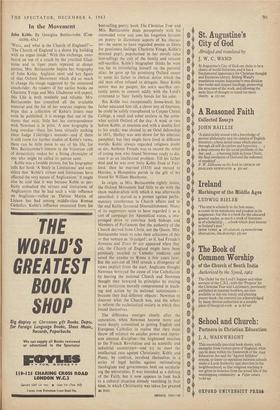In the Movement
John Keble. By Georgina Battiscombe. (Con- stable, 45s.)
`WELL, and what is the Church of England?'— `The Church of England is a damn big building with an organ inside.' With this exchange, over- heard on top of a coach by the youthful Glad- stone and in riper years repeated at dinner parties, Mrs. Battiscombe begins her biography of John Keble, Anglican saint and key figure of that Oxford Movement which did so much to change the image suggested by the untutored coach-rider. As readers of her earlier books on Charlotte. Yonge and Mrs. Gladstone will expect, this Life is both readable and reliable. Mrs. Battiscombe has consulted all the available material and the list of her sources inspires the hope that a collection of Keble's letters may soon be published; it is strange that out of the stores that exist, little but his correspondence with Newman is in print. A new biography is long overdue—there has been virtually nothing since Judge Coleridge's memoir—and if there is still room for further studies of Keble's views, there can be little more to say of his life, for Mrs. Battiscombe's interest in the Victorian cult of domesticity makes her a fitting chronicler of one who might be called its patron saint.
Keble was a lovable person, but his biographer calls her book 'A Study in Limitations' and con- siders that 'Keble's virtues and limitations have affected the very nature of Anglicanism.' It might also be said that it was because Keble so per- fectly embodied the virtues and limitations of Anglicanism that he had such a wide influence on Anglicans—rather as Therese Martin of Lisieux has had among middle-class Roman Catholics. Keble's influence emanated from his best-selling poetry book The Christian Year and Mrs. Battiscombe deals perceptively with his outmoded verse and uses his forgotten lectures on poetry to illuminate aspects of his charac- ter—he seems to have regarded poems as filters for passionate feelings. Charlotte Yonge, Keble's devoted pupil, popularised in her novels (also best-selling) the cult of the family and reticent self-sacrifice. Keble's biographer thinks he went too far in immolating himself on the parental altar; he gave up his promising Oxford career to assist his father in clerical duties which the old man often refused to delegate. Since Keble senior was no pauper, his son's sacrifice cer- tainly seems to consort oddly with the Lord's command to 'hate' family bonds for his sake.
But Keble was exceptionally home-bred; his father educated him till, a clever boy of fourteen, he could be safely transplanted to Corpus Christi College, a small and sober enclave in the some- what sottish Oxford of the day. A week or two before Keble, at nineteen and with a double first to his credit, was elected to an Oriel fellowship in 1811, Shelley was sent down for his atheistic pamphlet; but they might have lived in different worlds. Keble always regarded religious doubt as sin; Anthony Froude was to record the relief of young men who found Newman ready to dis- cuss it as an intellectual problem. Till his father died and he was over forty Keble lived at Fair- ford; then he married (1835) and moved to Hursley, a Hampshire parish in the gift of his friend Sir William Heathcote.
In origin, as Mrs. Battiscombe rightly insists, the Oxford Movement had little to do with the sham mediwvalism with which it was afterwards identified; it started, as a protest against parlia- mentary interference in Church affairs and to the end Keble favoured Disestablishment. Many of its supporters seem to have regarded it as a sort of campaign for Apostolical status, a two- pronged drive to convince both bishops and Members of Parliament that the authority of the Church derived from Christ, not the Queen. Mrs. Battiscombe tends to echo their criticisms of this or that venture as 'ill-judged'; as if, had Froude's Remains and Tract 90 not appeared when they did, the Church of England might have been painlessly recalled to Catholic tradition and saved the exodus to Rome a few years later. But the sort-out of 1845 reveals a divergence of views implicit from the start. Anglicans thought Newman betrayed the cause of true Catholicism by leaving the national Church and Newman thought they betrayed its principles by staying in an institution morally compromised in teach- ing and action by its national isolationism— because they had different objects: Newman to discover what the Church was, and the others to reform the ecclesiastical society in which they found themselves.
The difference emerges clearly after the separation, when Newman became more and more deeply committed to getting English and European Catholics to realise that they must throw off reliance on secular power and repres- sive internal disciplinethe frightened reaction to the French Revolution and its scientific and industrial counterpart—and try to meet the intellectual case against Christianity. Keble and Pusey, by contrast, involved themselves in a series of legal battles against rationalising theologians and governments bent on secularis- ing the universities. It was intended as a defence of the Faith, but it now appears to look back to a cultural situation already vanishing in their time, in which Christianity was taken for granted as true.
MERIOL TREVOR






































 Previous page
Previous page